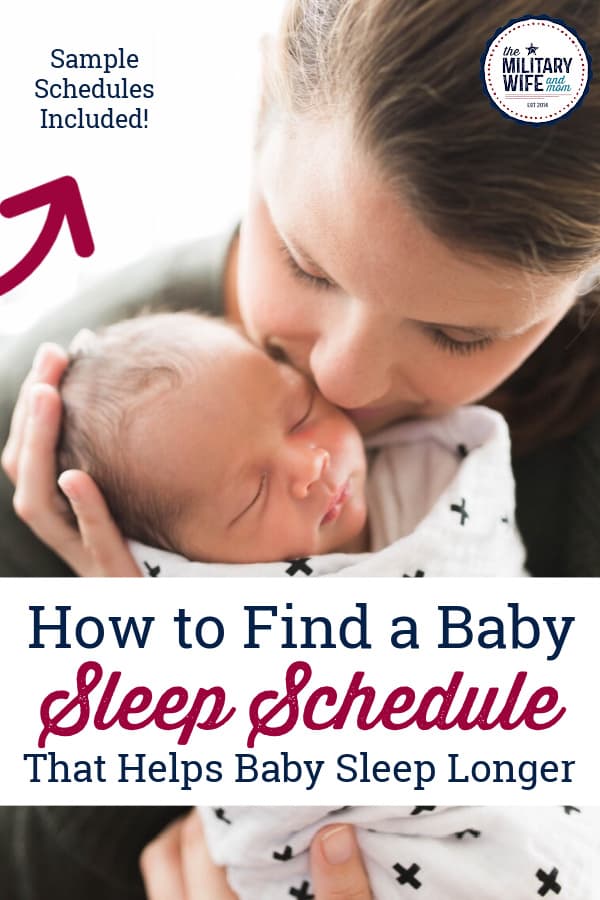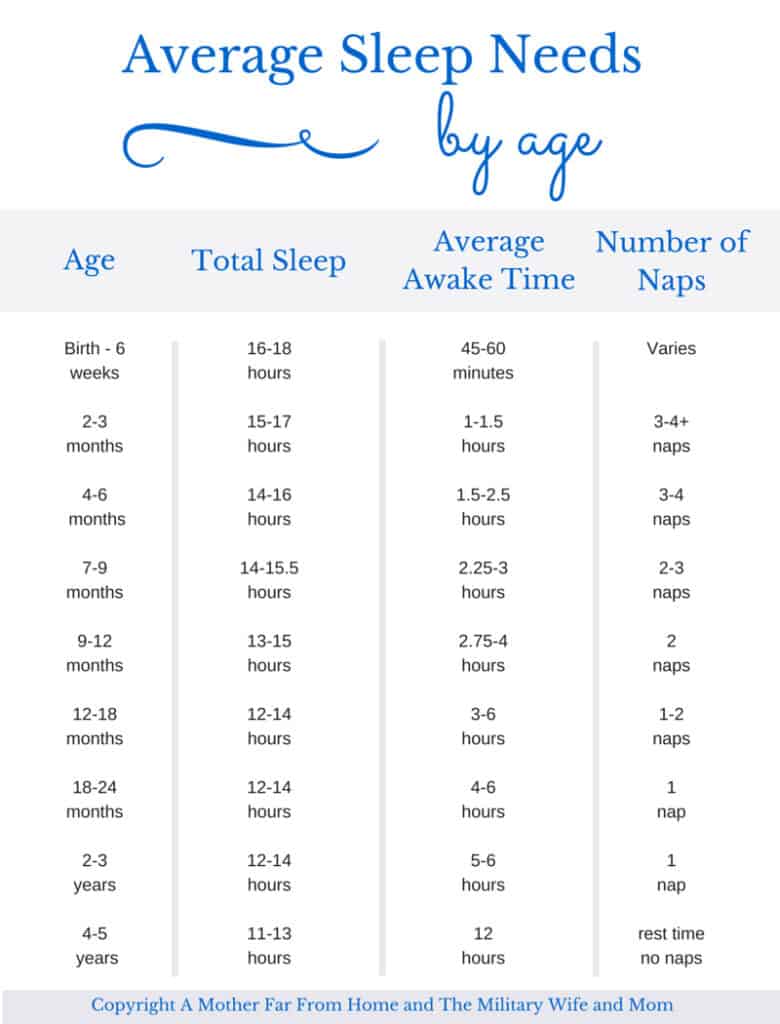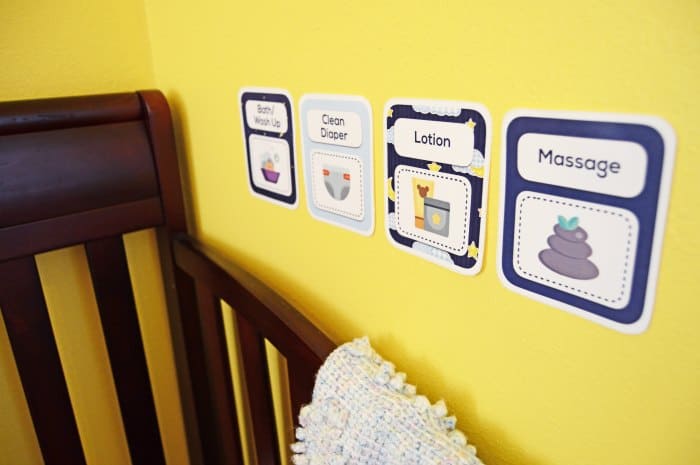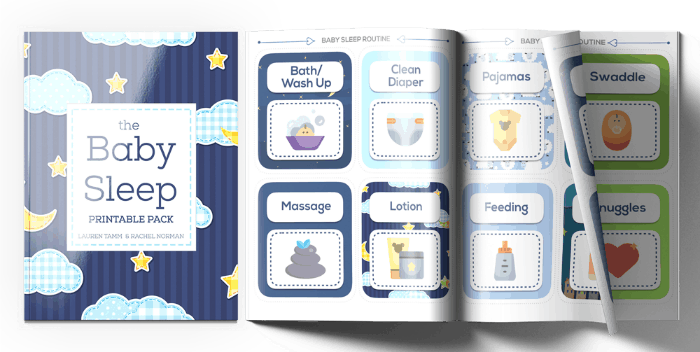Inside: Multiple baby sleep schedules to help you find one that is right for you. Two month old, four month old, six month old and up to 14+ month sleep schedules included.
In the first couple months, you’re home with a baby and they are super sleepy. It feels so easy. Like you’ve got this sleep thing down.
A few little rocks in the chair or pats on the bottom and zzzzzzzzzzzzzzz.
And then…they get a few months older and they are AWAKE!
They suddenly become harder to settle into sleep. And then, the baby is overtired, which makes it EVEN MORE hard to fall asleep.
Mama’s exhausted. Right?! Whew.
I’ve been right where you are.

Note: During the first 3-4 weeks of the newborn phase, there is no need to stress over implementing a schedule. You can simply try to do feedings every 2.5-3 hours at a minimum during the day and loosely try to follow the eat/wake/sleep cycle as described below.
How to Create a Baby Sleep Schedule (Plus, 6 Sample Schedules)
Right around 5-6 weeks old, I like to put my babies on a sleep rhythm. This need not be to the minute.
Think: Ballpark timing here.
But man, a good sleep routine / schedule can make ALL the difference when helping your baby start to settle into sleep easier.
1. Components of a good schedule.
First, let’s explore what a good schedule may involve. I like to lay out all the pieces and then place them where they seem to fit best.
- Morning wake up time
- Nap times
- Number of naps
- Feeding times
- Playtimes
- Bedtime
2. Getting the eat/wake/sleep cycle down.
The eat/wake/sleep cycle is a great way to help your baby transition to a great schedule. First, the baby wakes from sleep and EATS a full feeding. Second, the baby is AWAKE to play for an approximate designated period of time. Lastly, the baby goes back to SLEEP for a nap or bedtime after showing a sleepy cue (e.g. a yawn, fuss or eye rub).
This cycle repeats itself throughout the day, and during the night (if the baby is still taking night feeds) the cycle is simply EAT/SLEEP. The baby would eat and then go back down to sleep until he needed another feeding.
For more on figuring out how long your baby should be awake (i.e. awake time duration), check out my post How to Lay your Baby Down Awake, but Drowsy where I elaborate on finding your baby’s sleep window.
3. How does a schedule help sleep?
Routines and schedules help our children learn what to expect. Like I’ve said before, the world is a very chaotic place for children, and routines provide a sense of safety and security overtime. They also help your child feel confident and comfortable, knowing what comes next in a day to day routine. Routines also help cue children for sleep.
After a certain series of events (like play, then lunch, then pre-nap routine for example) a child will learn to expect sleep shortly thereafter if it is done similarly everyday. In addition, if your child goes to sleep for naps and bedtime at approximately the same time everyday, he will likely be tired around the same time everyday.
Read This: Daytime and Nighttime Sleep Routines to Help Baby Fall Asleep Faster
4. How many hours of sleep does baby need?
This chart will help you understand how much sleep you baby needs.
It can overwhelm parents, BUT if you are a numbers person and want to nail down both daytime sleep and nighttime sleep for your baby, these are some average sleep needs you can use as a reference point.

So for example, if you have want to create a 4 month old baby sleep schedule, you would be looking at a total of 14-16 hours of sleep per 24 period with 3-4 naps and 1.5-2.5 hours of awake time before baby needs another nap.
What does this mean?
Well, let’s say your baby wakes up at 7 am. Your baby would be awake for 1.5 – 2.5 hours before going down for a nap.
The 14-16 hours of sleep (add up both daytime and nighttime sleep) per 24 hour period is a very rough estimate that you can aim toward.
5. Addressing Sleep Regressions for 2-12 month old babies.
I have several posts that talk about baby sleep regression and sleep disruptions. It is very common to see 4 month sleep regression and subsequent regressions at 6 month, 8 month, 18 month and 2 years old.
Sleep regressions are typically coinciding with developmental milestones.
- Why Do Babies Fight Sleep? 12 Reasons and Solutions
- Top 3 Causes of Baby Sleep Regression and How to Fix It
- 3 Important Things to Rule Out During Baby Sleep Regressions
- How to Handle Baby Sleep Debt / Severely Overtired Baby
If later you find yourself dealing with 2 year old sleep regression, bookmark this post.
6. Let’s address sleep-training.
Like anything in parenting, sleep approaches are a very personal choice. I like to think of it more as sleep coaching your baby. All babies are capable of sleep. It’s only a matter of helping them use the innate tools they have to start sleeping well.
Read This:
- How to Lay Your Baby Down Drowsy, But Awake
- 3 Things to Consider Before Baby Sleep Training
- How We Chose to Sleep Train Our Babies
2 month, 4 month, 6 month, 8+ month old sleep schedules.
Here are a few examples of sleep schedules to get you started. Ultimately you will need to look at what your baby is telling you with regards to wake time and duration of naps.
We have always preferred a 7:00 am wake up time and a 7:30 bedtime in our home. It is what serves our family best. So you will notice that is what my sample schedules revolve around. Use these schedules as a tool or guide to help you and then adjust the times so they best serve your child and your family.
Any wake up time between 6-8 am is ideal, and any bedtime between 6-8 pm is ideal. So go ahead and choose a morning wake up time and a bedtime and then fill in the naps and feedings throughout the daytime.
And lastly before we dive in, REMEMBER…always feed your baby when he is hungry, always add in more feedings when needed, and know all times are just approximate. Kids aren’t robots; flexibility is key!
2.5 hour schedule (Approx 1 to 3 month old sleep schedule):
A schedule common anywhere from 1 to 3 months. Always add in more feedings if needed. For the first few months, I often cluster fed every 2 hours in the evening. My son was very fussy during that time, and regardless if he was truly hungry or not, I still nursed him to help get us through that tough part of the day for him.
- 07:00 am wake up for the day, eat, play
- 08:00 am nap
- 09:30 am wake, eat, play
- 10:30 am nap
- 12:00 pm wake, eat, play
- 1:00 pm nap
- 2:30 pm wake, eat, play
- 3:30 pm nap
- 5:00 pm wake, eat, play
- 6:30 pm bedtime routine, bath, bottle
- 7:00 pm bed, down for the night
- 10-11 pm Dreamfeed (if desired)
- 11 pm-7 am night feeds (as many as your baby needs)
Note: You can read more about the dreamfeed in my newborn baby sleep tips, but know that it typically becomes more disruptive than helpful after the 4 month old baby mark. It is only intended to be helpful when your baby is still young. It’s up to you if you think it will help.
I’ve heard both pros and cons. We did it with our son, but I’m not 100% if we will do it in the future or not. Honestly, I think it could go either way.
Example nap schedule for 1 to 3 month old.
In the above example, the nap schedule would be as follows:
- 10:30 am nap
- 1:00 pm nap
- 3:30 pm nap
3 hour schedule (Approx 2 – 6 month old babies):
A schedule common from 2-6 months. Some babies can tolerate a 3 hour schedule earlier than 2 months old. It really depends on how much your baby weighed at birth, how long your baby can stay awake, and how many feedings your baby requires during the daytime. If you are feeding more frequently than every 3 hours during the night, you may want to stay on a 2.5 hour schedule for a bit longer until your baby drops a night feeding. The theory behind it is the more feedings your baby receives during the day, the less he may need during the night.

I believe I moved to the 3 hour schedule around the 7 week mark. Some babies are ready to move on to the 3.5 hour or 4 hour schedule around the 4 month old mark, while other babies need to remain on a 3 hour schedule for a bit longer.
Again, listen to your baby and do what you think is best.
- 07:00 am wake up for the day, eat, play
- 08:30 am nap
- 10:00 am wake up, eat, play
- 11:30 am nap
- 1:00 pm wake up, eat, play
- 2:30 pm nap
- 4:00 pm wake up, eat, play
- 5:00-5:30 pm cat nap
- 7:00 pm bath, bedtime routine, eat, down for the night
- 10-11 pm dreamfeed (if desired)
- 11 pm – 7 am night feeds as needed
Example nap schedule for 2 to 6 month old.
In the above example, the nap schedule would be as follows:
- 8:30 am nap
- 11:30 am nap
- 2:30 pm nap
- 5:00 pm catnap
3.5 hour schedule (Approx 3-6 month old sleep schedule):
A transitional schedule to use during the 3-6 month age range if needed before moving to a 4 hour schedule. Sometimes this is skipped all together and the baby is moved straight from a 3 hour schedule to a 4 hour schedule.
- 07:00 am wake up for the day, eat, play
- 08:45 am nap
- 10:30 am wake, eat, play
- 12:15 pm nap
- 1:45 pm wake, eat, play
- 3:30 pm nap
- 5:00 pm wake, eat, play
- 7:00 pm bath, bedtime routine, bottle, down for the night
- 10-11 pm dreamfeed (if desired)
- 11 pm – 7 am night feeds as needed
Use these printable (and adorable!) baby sleep routine cards to keep parents, grandparents and babysitters ALL on the same page.
Example nap schedule for 3 to 6 month old.
In the above example, the nap schedule would be as follows:
- 8:45 am nap
- 12:15 pm nap
- 3:30 pm nap
4 hour schedule with 3 naps (Approx 4 month olds and up)
A schedule common during the 4-6 month age range. The 4 hour schedule is a huge milestone! Once your baby reaches the 4 hour schedule, he will basically be on such a feeding schedule indefinitely. As adults, it is most common to eat about every 4 hours during the day. Once your baby is taking solids, you may end up adding 1-2 snacks during the day, which is totally fine.
- 07:00 am wake up for the day, eat (+solids if started), play
- 09:00 am nap
- 11:00 am wake, eat (+solids if started), play
- 1:00 pm nap
- 3:00 pm wake, eat (+solids, if started), play
- 5:00-5:30 pm catnap
- 5:30 pm possibly solids during dinner with the family
- 7:00 pm bath, bedtime routine, bottle, down for the night
- Dreamfeed: This is usually the age range when the dreamfeed is dropped as it becomes more disruptive to sleep.
- 7 pm – 7 am night feeds if needed
Note: During the 6-9 month age range your child should be able to drop the third nap (the cat nap) and you will be down to 2 naps per day.
Read This: 5 Month Old Baby Sleep Schedule for Busy Moms
Example nap schedule for 4 months old+.
In the above example, the nap schedule would be as follows:
- 9:00 am nap
- 1:00 pm nap
- 5:00 pm catnap
4 hour schedule with 2 naps (Approx 6 month old and up)
A schedule common for 6+ months.
- 07:00 am wake up for the day, eat (+solids), play
- 09:00 am nap
- 11:00 am wake, eat (+solids), play
- 1:00 pm nap
- 3:00 pm wake, eat, play
- 5:00 pm dinner with family
- 7:00 pm bath, bedtime routine, bottle, down for the night
- 7 pm – 7 am night feeds if needed. Talk with your pediatrician about what age would be appropriate for night weaning.
Note: When your baby is ready (usually during 6-9 months) go ahead and drop for 3 naps to 2 naps. Then you will basically stay on this schedule (outside of maybe shortening naps and increasing wake time when needed) until your child is ready to transition down to one nap (typically during the 14-18 month age range).
4 hour schedule with 1 nap (Approx 14 month olds and beyond):
A schedule common for 14+ months
- 07:00 am wake up for the day, eat breakfast, play
- 09:30 am possible morning snack if needed
- 11:30 am lunch
- 1230-1:00 pm nap starts
- 3:00-4:00 pm nap ends
- 3:30 pm snack (or whenever nap ends)
- 5:30 pm dinner with family
- 7:00 pm bath, bedtime routine, sippy or bottle with milk, down for the night.
Note: Once your child is ready to transition to one nap (typically during the 14-18 month age range), you will remain on a similar schedule until your child stops napping.
Read This: BEST 1 Year Old Sleep Schedules From Real Moms
Print your free baby sleep checklist!
Chances are…you’ll love this handy checklist of baby sleep basics. This printable simplifies it! Plus, when you grab this printable, you’ll get instant access to my free 3-day baby sleep eCourse.
Download your free printable
- Download the checklist. You’ll get the printable straight to your inbox, plus get my Free 3-Day Baby Sleep eCourse!
- Print. Any paper will do the trick, but card stock would be ideal.
- Place it on your refrigerator. Use it as a quick reference and don’t forget a thing!
More baby sleep tips.
- Top 10 Baby Sleep Tips That Will Help You Get More Sleep
- 8 Infant Sleep Facts Every Parent Should Know
- Best Baby Sleep Tips for Longer Naps
- 5 Month Old Sample Routine for Busy Moms
- 1 Year Old Sleep Schedules From Parents
Find your printable pack here.
I've created a free email series just for you! If you are struggling with finding a routine, rhythm or schedule, this email series will help you find one that will work for YOUR family. Yes, really. I've seen my sample routines work time and time again for parents. I know it can work for you too.
This free email series will help you:
- Free sample routines for your child
- Best morning routine tips and tricks your kids will actually follow
- All-time favorite parenting hacks for getting more cooperation at bedtime
- Step-by-step guide for using a printable daily schedule with kids












Hello, thanks for the great blog. I have a question on the 3.5 hour routine. After baby’s last nap I see he eats at 5 then 7. We are currently feeding our son 6 oz bottles. So when he wakes at 5, would we give him 6 oz, and then another 6 2 hours later? Also, do you give the bottle right at 7 then straight into bed, or at like 6:40, so then he can be done and asleep by 7? My son is currently waking like 5, and then I can hold off on feeding him til almost 6, then bedtime routine and bed at 7. Then he wakes at 9:30 and 1 am to eat. If we fed him right before bed as well, that would be 42 oz a day
Hi,
I was just wondering what you recommend for premies? My little one was born 8 weeks early (he is currently 3 months 3 weeks corrected age – 1 month 3 weeks adjusted) and we are having difficulty finding the right schedule to try him on. I have tried the 4 hour one and he is just soooo fussy and generally wakes early from his naps and cries until I cave in and feed early or distract him as best I can. I am breastfeeding and during the nights he is getting a dream feed around 10pm and waking once at 3am for a feed than sleeping until 6:30am. Any suggestions for during the day? Thanks so much! Love your blog.
I would definitely keep him on the 2.5 hour or 3 hour schedule for quite some time. Some kids are ready for a 4 hour schedule at the very, very soonest 4 months. We did not move to a 4 hour schedule until about 6 months of age. So I agree with you that he isn’t ready for it and probably needs to eat more frequently during the day. Hope this helps 🙂 Sounds like he is doing perfectly at night!Waking only once to feed at 3 am is very good. I wouldn’t expect him to drop any more night feeds until 4 or 5 months of age at the very, very soonest.
Lauren
Hi Lauren,
My daughter just turned one this month and it seems as though from the start, I’ve never been able to get her on a consistent schedule! I’m a total stickler for routines and know how beneficial they are for getting babies to sleep well (totally helped with my first), but what do you do when the baby won’t follow them? I know babies aren’t robots and each have their own personalities, but I feel like I can’t find a schedule that’s working for her. We always struggled with her short naps on/off, even now, but now for a couple months she’s been waking up very early and not getting enough night sleep. I put her to bed around 7-7:30pm and she wakes up at 5-5:30am. I feel as though at her age she should be sleeping 11-12 hours at night. She’s had 12 hour night here and there but I haven’t seen that in a while. When she wakes that early, I leave her in there until 6am or later but she just stays awake babbling to herself. Do you have any advice for a strong willed baby?
I think it’s so normal for her to have early morning wakings! Keep doing exactly what you are doing. You really are doing all the right things. My son used to wake up early and talk to himself and we simply left him in his room until it was “time” to get up. Our wake up time is 7 am. So unless he is crying or something is wrong, he stays in bed until 7 am. Eventually he learned there wasn’t any excitement or benefit to waking early and he started sleeping later. So keep doing what you’re doing!
Just to clarify, your 7:00 PM time, is that when you start the bedtime routine, or when the baby should be asleep? I am a working mom, so I struggle with a 7:00 PM asleep time. Also, we found that our baby has more night wakings the earlier he goes to bed. Is this common and we should keep working at it, or is he just a night owl?
It is perfectly fine to do a 7:30 pm or 8 pm bedtime if that works better for your family. Personally, I would not go later than 8 pm because most kids need a minimum of 10 hour time window for night time sleep. It depends on your morning wake up time as well. You could email me at themilitarywifeandmom {at} gmail {dot} com if you would like to chat in more detail.
Hi Lauren. I just found.your blog and I love it. I have a soon to be 8 months old baby girl
I am a first time mother and i have struggle all.this time to.get my daughter in an schedule. I try to follow.the eat play routine for.the most part but I am confused for what you do if your baby don’t nap enough as per schedule Do you feed her right after waking up or wait to feed her until.the schedule time? Also do you keep her awake until.next nap schedule . I end up feeding when.she wakes up as well as when she fusses.to be feed. She is so unsettled while eating and do not.have a full feeding ( I breastfeed). She is having so much difficult.time.to keep sleep at night. I try the.modified CIO with comforting being.in the room with her.
It improved her awakenings for.a.couple.of.days but she started crying more and more over two.hour and getting louder and I end helping.her to sleep and.waking up more often. I decided I don’t want to try any CIO version but a gentle option. What do.you recomend.? Thanks
Hey Patricia, it sounds like you are doing an amazing job. I usually feed right after waking and just squeeze in another feeding if I need to during the day. I always err on the side of feeding more, rather than less. But at 8 months she most likely can make it through the day by nursing around 5-6 times. I would read this: https://themilitarywifeandmom.com/3-important-goals-consider-baby-sleep-training/. And maybe you’ve already checked my book out, but I go into a lot more detail in my book here: https://themilitarywifeandmom.com/sleep
Hi Lauren, Not sure i f you are still reading posts! Your blog is great! But we’ve been trying the ews cycle for a few weeks loosely and have now started full on sleep training last week with our 14 week old. He weighs 15+ lbs and we just felt he was def ready for sleep training. He currently will go down to bed between 830/9pm (takes about 21 min for him to fall asleep) with one MOTN feeding around 230/3am . So far our LO is doing pretty good! We are trying to get him on a 8am DWT, 8/9pm bedtime schedule, but he keeps waking up at 645am. With the time change coming I am super nervous this is going to turn into 545am! His naps are great and it takes him anywhere from 5-10 min to fall asleep on his own. Any pointers, our active schedule right now is:
7am Wake up/nurse ( I stall him if he wakes up at 645am unless he is fussing which he isnt too bad usually)
8:30-10:30am Down for nap 1 (Is this too long of a nap, should I wake him up at 1.5 hr nap to keep on schedule more so throughout the day?)
10:30am 5oz bottle BM
Noon-2pm Nap 2 (again he has been taking a 2 hr nap here, is this too long, i wonder if this will affect night sleep at all and bedtime?)
2pm 5 oz bottle BM
3:30pm-4:30pm – Nap 3 (usually only 45 min to an hour nap here)
4:30pm – 4 oz bottle BM (hasn’t been taking the full 5 oz here)
6-6:45pm Cat nap (not sure if this is too close to bedtime but he gets really tired at this time so I have to put him down)
7pm – Nurse plus give him 1oz in a bottle to make sure he is full
7:30pm bedtime routine ( diaper change, pjs, book)
8pm In bed (takes him 21 min to fall asleep, and sometimes he’ll wake up 10 min later, then go back to sleep within 10 min, and then an hour later, but back to sleep in 10-15 min for the night)
Haven’t quite gotten the bedtime routine down to find the sweet spot of when he will go down best. This has been our schedule for the past two days though. Any help would be greatly appreciated! Thank you!!
Hi there! Great blog article! New mom of a 6 week old here, trying to get him on a schedule. We were previously just going on demand, but he has naturally been falling close to your 3 hr schedule, so we’re going to try to make it a little more solid.
2 questions: do you do diaper changes before or after feedings? And, what do you do if your LO wants to snooze after a feeding? Our boy seems to be awake after some feeds and sleepy after others.
Thanks!
Hi! I love your blog, it’s so helpful! But what do I do if my 8 week old is waking up at 5:30 crying and hungry? Do I try to hold her off or do a feeding and then have her slee until 7 and feed her again?
I would definitely feed her. It’s always okay to feed a hungry baby 🙂 For early morning wakings you may just want to give her a half-feeding (one breast if your breastfeeding or half a bottle). Then if she is able to return to sleep, feed her again at 7. Hope that helps! Lauren
Hi! I have a question about scheduling times. I have an almost 4 month old bf baby that is currently on a 3.5 hour schedule. He’s getting closer to being ready to be on a 4 hour schedule. The only problem is we have to wake him up at 6 every morning to eat to get him to daycare before we go to work, and I’m struggling to figure out a new schedule that doesn’t put him to bed at 6pm. Any suggestions?